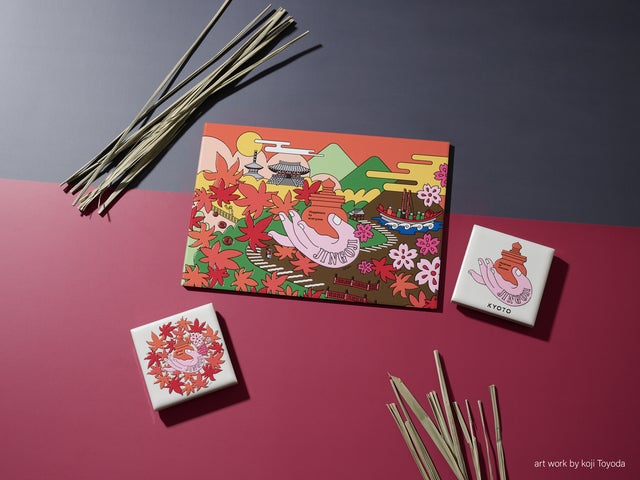
Penon Corporation (headquarters: Chiyoda-ku, Tokyo), which manufactures products that lead to the resolution of global and social issues, will be selling exclusive original PENON art goods featuring artwork by artist Koji Toyoda in a special shop at the venue (2nd floor of the Heiseikan) in conjunction with the special exhibition "Jingo-ji Temple – Kukai and the Origins of Shingon Esoteric Buddhism" to commemorate the 1,200th anniversary of the museum's founding, "Jingo-ji Temple – Kukai and the Origins of Shingon Esoteric Buddhism," to be held at the Tokyo National Museum (Taito-ku, Tokyo).

We at PENON are a sustainable brand that aims to realize a sustainable society through the use of certified wood, the promotion of plastic-free products, and resource circulation through recycling. By using our proprietary printing technology to create realistic bumps and grooves, we are developing a new type of art goods that allows you to immerse yourself in the world of the artwork with your fingertips.
KOJI TOYODA x Jingoji Temple collaboration items
■Touch Me! Wooden Postcards
The colorful illustrations center around the medicine jar held by the National Treasure "Standing Statue of Medicine Buddha," a masterpiece of early Heian sculpture, and depict the natural surroundings of Jingo-ji Temple, known as a famous spot for its autumn leaves and fresh greenery. The illustrations also show the route to the temple, from Takao Bridge at the entrance to the temple, up the long stone steps to Jizo-in Temple at the very back of the temple grounds, where you can see the magnificent view of Kinunkei Valley, and people enjoying the warding off evil spirits with "kawarake throwing." If you look closely, you can even see the image of Kukai, who returned to Japan from China in 806. This 3D postcard is packed with the charms of Jingo-ji Temple's famous sites and history.
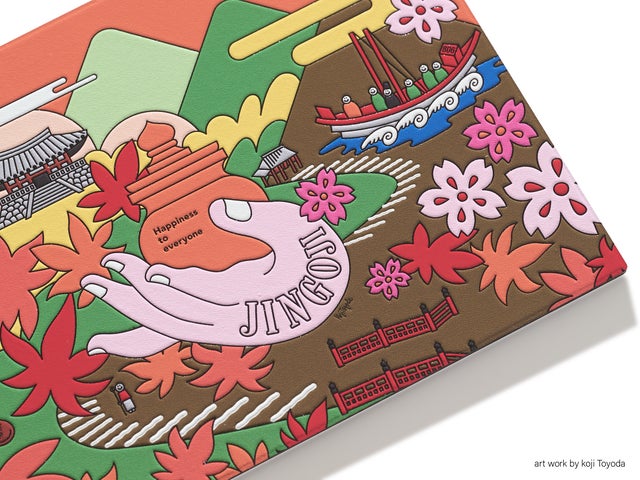
"PENON Touch Me! Wood Postcards" are wooden postcards made from sustainable wood that is recycled from scraps and waste materials. If you are in Japan, you can post it by attaching a 98 yen postage. Because it is sturdy, you can also enjoy it as an interior decoration by simply propping it up on a shelf or table.
PENON Touch Me! Wood Postcard
Total of 1 type 990 yen (tax included)
*This product is available in limited quantities and will end as soon as stock runs out.
■Touch Me! Art Magnet
This exhibition marks the first time in the history of Jingoji Temple that the "Standing Statue of Medicine Buddha" will be displayed outside the temple, and it has long been worshipped as a Buddha who saves people from illness and disaster. Its voluminous form and dignified expression create a unique impact, and it is said to be the greatest masterpiece of early Heian sculpture. The three-dimensional magnet combines the motif of the left hand holding a medicine jar with the majestic nature of Jingoji Temple, creating a bright and gorgeous design that will naturally blend in with any interior decor.
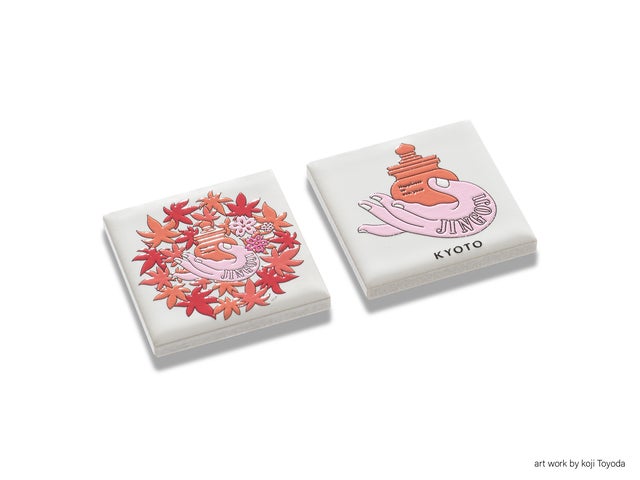
"PENON Touch Me! Art Magnet" is an original sustainable product by PENON that uses tiles made from upcycled Mino ware waste, and was born from the ingenuity of using limited resources without waste. It has the soft texture and moderate weight that only ceramics can provide, and is finished in a luxurious design that fits in stylish spaces.
PENON Touch Me! Art Magnet
(From left) Autumn leaves, hands
Total of 2 types, 990 yen each (tax included)
*This product is available in limited quantities and will end as soon as stock runs out.
Profile of Koji Toyoda
Born in Osaka on May 22, 1962. Artist. Since childhood, he has loved drawing, surfing, fashion, and music. In 1992, on his 30th birthday, he designed the Enjoy SURF logo. In 1997, he held his first exhibition in California. In 2023, he will hold a solo exhibition of his work "Kokoro" at Kongobu-ji Temple in Koyasan as a special exhibition commemorating the 1250th anniversary of the birth of Kobo Daishi. In addition to his colorful and peaceful paintings, he continues to express his unique worldview through collaborations with various companies and brands from around the world.
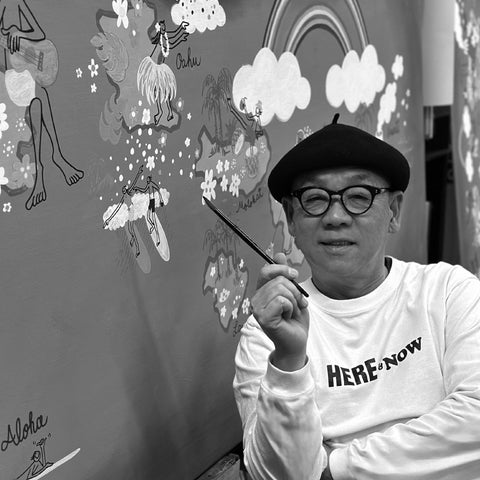
Special exhibition commemorating the 1200th anniversary of the founding of Jingoji Temple: Kukai and the origins of Esoteric Shingon Buddhism
Jingo-ji Temple, located in Takao, northwest of Kyoto City, has long been known as a famous spot for viewing autumn leaves. In the first year of the Tencho era (824), two temples, Takao-san-ji Temple and Shingan-ji Temple, were merged to form Jingokokuzo Shingon-ji Temple (Jingo-ji Temple). Takao-san-ji Temple was the family temple of Wake no Kiyomaro, who proposed moving the capital to Heian, and was the base of operations for Kukai, who studied esoteric Buddhism in China, after returning to Japan. National treasures such as the Kanjo Rekimei and the Ryokai Mandala (Takao Mandala) are works directly related to Kukai. In addition, the National Treasure "Standing Statue of Medicine Buddha," which was enshrined at the predecessor temple of Jingo-ji Temple, is the greatest masterpiece of sculpture in the early Heian period, and this is the first time in the history of Jingo-ji Temple that it has been exhibited outside the temple. This exhibition is a rare opportunity to introduce the many temple treasures handed down at Jingo-ji Temple, the birthplace of Kukai and Shingon Esoteric Buddhism. Please come and see these precious cultural assets that have survived the rough seas of history for over 1,200 years.
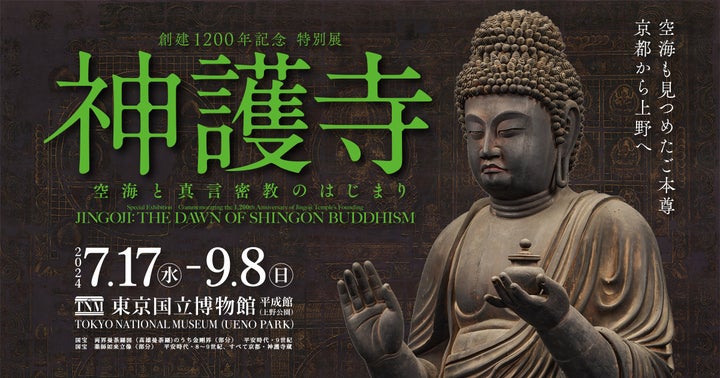
Exhibition title: Special exhibition commemorating the 1200th anniversary of the founding of Jingoji Temple – Kukai and the origins of Esoteric Shingon Buddhism
Venue: Tokyo National Museum Heiseikan (Ueno Park)
Date: July 17th (Wednesday) – September 8th (Sunday), 2024
Closed: Mondays and August 13th (Tuesday)
*However, the museum will be open on Monday, August 12th (a national holiday).
*The general cultural exhibition will open on Tuesday, August 13th.
Opening hours: 9:30am – 5:00pm
* Open until 7pm on Fridays and Saturdays (except August 30th and 31st)
*Last admission is 30 minutes before closing.
Special website: https://tsumugu.yomiuri.co.jp/jingoji/
[Product Inquiries]
Penon Co., Ltd.: info@penon.co.jp
PENON Official Website: https://penon.co.jp
PENON Official Instagram: @penon_japan
